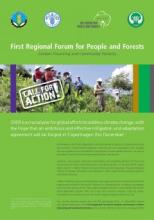Land Library Search
Through our robust search engine, you can search for any item of the over 73,000 highly curated resources in the Land Library.
If you would like to find an overview of what is possible, feel free to peruse the Search Guide.
/ library resources
Showing items 1 through 9 of 16.Property rights economically empower women by creating opportunities for earning income, securing their place in the community and ensuring their livelihoods. When women are economically empowered, it spurs development for their families and communities.
Thousands came together in "Hopenhagen" from 7-18 December 2009 for what was the most covered and talked about of any United Nations Framework Convention on Climate Change (UNF CCC) Conference of the Parties (COP) to date.
Hosted in Hanoi, Vietnam, from 18 to 20 August 2009, the First Regional People and Forests Forum on Carbon Financing and Community Forestry brought together more than 80 people from 12 countries, including key government, civil society, private sector, and international organization participants.
The Bali Action Plan identified two key areas for the forest sector to contribute significantly to global climate change mitigation. One area concerned approaches and incentives relating to reducing emissions from deforestation and forest degradation in developing countries (REDD).
This bulletin draws on country-level experience to share civil society perspectives on the challenges, opportunities, and possible approaches for pro-poor REDD.
The 450 million people living in and around Asia-Pacific forests hold a vital stake in the success of REDD. For effective reductions in emissions from deforestation and forest degradation, such schemes must:
The protection given to the land rights of women, orphans and any other vulnerable groups in Northern and Eastern Uganda is probably as good as can be found anywhere in the world. Customary land law is based on three main principles.
Local people hold the key to healthy forests, and if forest carbon-financing schemes are to succeed, they must actively engage and benefit these crucial stakeholders.
In many areas within the Asia-Pacific region, there are compelling short-term incentives to degrade or to convert forestland for other uses.








